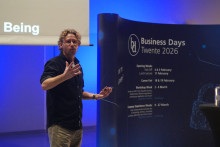Today’s course in the Drienerburght hotel was the first in the series of twelve Active Bystander trainings that will be held at the UT in January and February. All of them are led by Scott Solder and aim to teach the participants how to address unacceptable behaviour at the workplace, covering topics such as intimidation, sexual harassment, bullying and any form of exclusion.
‘The chances of getting eaten at the UT are very slim’
Solder began the session by explaining why we often refrain from ‘speaking up’ if we witness inappropriate behaviour. ‘We are governed by a very strong instinct to survive. Part of that is to not stand out from the crowd. This comes from the time when we could get eaten if we stood alone. But the chances of getting eaten at the UT are very slim.'
Even so, people tend to be torn between two conflicting rules: to help someone in need and to do what everyone else is doing - which often means doing nothing at all, as Solder showed in his presentation.
‘Somebody has to go first’
‘The bystander effect shows that a victim is less likely to receive help if surrounded by a lot of people rather than a single bystander, because you expect somebody else in the crowd to help,’ continued Solder. ‘However, we can see that the moment somebody steps up and offers help, it suddenly becomes acceptable to do the same and more people join. The message of this? Somebody has to go first!’
There is a number of reasons why people don’t want to go first, according to the coach. ‘There is social influence, people think “Oh this is just how it goes in academia”. They are also afraid of retaliation, especially in academia they believe that the offender has the power to ruin their career. And particularly if the offender is a high-profile and important person, we subconsciously normalize their behaviour by making excuses for them. We convince ourselves that special rules should apply because they are so valuable for the organization.’
Active Bystander toolkit
To overcome our natural inclination to ‘not step up’, Scott Solder presented an Active Bystander toolkit. ‘Our instinctive reaction to danger is to freeze. Which leads to inaction. That is why we designed this toolkit to overwrite our instincts.’ The toolkit is based on the so called ‘four Ds’: Direct action (doing something now), Distraction (diffusing the situation), Delegation (telling someone with authority) and Delay (reacting later). These ‘Ds’ can be used as a guidance when you find yourself in an awkward or uncomfortable situation at work.
‘It feels uncomfortable to report on somebody. Nobody wants to be a snitch. But you need to do it sometimes because inappropriate behaviour can lead to psychological and other problems. Sometimes you need to be a snitch.’
What would you do?
After knowing of all the ‘Ds’ at their disposal, the participants of the training were asked to consider the best course of action in various scenarios – all based on real situations observed at various universities. For instance, how would you react if you saw a senior manager shouting at a more junior member of staff? Knowing that this happens regularly and that the Head of the Department is aware of it.
‘There is no right or wrong answer,’ said Solder. ‘You can pick any of the Ds. What you shouldn’t do is to panic and freeze. People often agonize over the decision to act. Am I justified? You only need to do two tests: does anyone in the situation look uncomfortable? And am I uncomfortable? If even only one of them is true, an action is justified.’
‘Most of our communication is nonverbal’
At the end of the session, Solder offered a few specific tips and tricks on how to act if you are confronted with unacceptable behaviour at the workplace. ‘If you want to directly challenge a bully, you need to remember that we are closely related to chimpanzees. Most of our communication is nonverbal. You therefore first need to have the right facial expression. It helps to raise – but not point – your index finger and to visibly breathe in, signalling that you are about to speak. Use the right tone of voice and be assertive. Most people don’t stand up to bullies. The bullies don’t expect it and it intimidates them if you do.’







